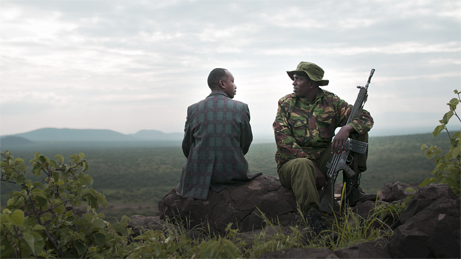The title of Jon Kasbe’s suspenseful documentary promises a certain amount of role reversal, and it ultimately delivers on it. Centering on the illegal poaching trade in northern Kenya, its main subjects include two men who hunt and slaughter elephants for ivory and a lawman sworn to arrest perpetrators like them. Kasbe employs a vérité aesthetic, staying largely unseen as his subjects pull the narrative back-and-forth across the line separating the lawful from the lawless.
One of the poachers is X, who boasts of having killed many animals over the years and never having been caught. Initially, his remarks about his “strong brain” come across as bravado, but he is indeed thoughtful and cautious. For example, during a meeting with a client who wants more elephant tusks than X has been providing, he balks at being rushed. His partner is Lukas, who is proficient with a bow and poison-tipped arrows, which make less noise than guns and are untraceable.
Asan is a ranger who patrols the nearby forests. Kasbe embeds himself with Asan’s unit, leading to intense sequences in which he runs right alongside the other rangers as they dash into the brush, weapons drawn, to encircle would-be poachers. There is a sense of visceral excitement to these moments, but Kasbe doesn’t shy away from pointing out how dangerous the work is. We attend the funeral of a ranger who was murdered in the line of duty, and Asan’s pregnant wife worries that the same fate will befall him.
From the beginning, we assume that X and Asan are on a collision course, and their paths cross about midway. However, it proves less a showdown than an opportunity to compare notes about how the other is faring in life. X and Asan may be on opposite sides of the law, but they have much in common personally, and the extent to which they do provides many of the surprises in the film. What also becomes clear is that poaching isn’t reserved for hard-core criminals but is a typical means of survival in a place devoid of economic opportunities.
It is, in fact, larger societal forces around X, Lukas, and Asan that spur the actual conflicts they face. On the one hand, the government has been short on funds, and so Asan and his fellow rangers have not been paid in months. Yet at the same time, Kenyan President Uhuru Kenyatta has called for a crackdown on poachers, meaning more rangers, making it far more difficult for X and Lukas to operate. What follows is a rising sense of desperation on both sides, slowly burning toward an ending laced with irony. As it turns out, rangers may be no less opportunistic than their criminal counterparts, but when the opportunities dry up on both sides of the law, the film asks, what then?
Through it all, Kasbe captures the scenic beauty of northern Kenya, especially the majestic wildlife that at times seems to be live uncannily close to humans. However, the most powerful imagery includes large piles of recovered ivory tusks set ablaze by the government, hinting at the staggering number of elephants massacred in order to supply the illegal market. Kasbe never lets us forget how horrific poaching is, though unlike a documentary such as Kate Brooks’s 2017 The Last Animals, which almost entirely focused on species of African elephants and rhinoceroses nearing extinction, this film looks at how the conservation effort has affected people, who are now viewed as the less valuable resource.







Leave A Comment